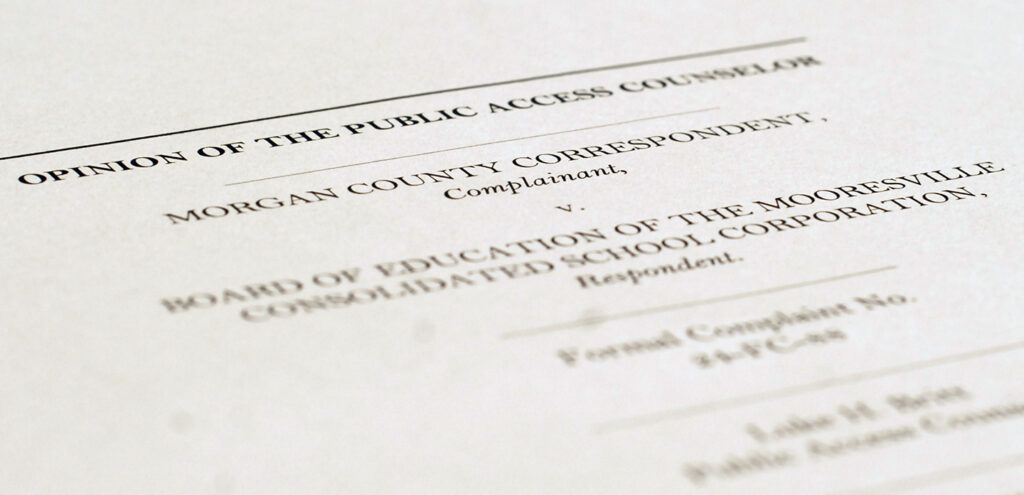
MORGAN COUNTY — The state’s expert on public access laws issued a formal opinion last week that the Mooresville school board did not comply with state law when it appointed a new school board member last November.
The Morgan County Correspondent LLC newspaper (MCC) filed a formal complaint in December with Public Access Counselor Luke H. Britt — a state-level appointed position that “provides advice and assistance concerning Indiana’s public access laws to members of the public and government officials and their employees.” The PAC also offers formal advisory opinions in the case of disputes over Open Door Law and Access to Public Records Act.
In the case of the Mooresville school board, The Correspondent alleged two separate violations.
The first is that the board failed to solicit public comment — as required by law — on the final action taken by the board to appoint a new member to the school board following the passing of Dr. Bill Roberson.
“In total, the board spent fewer than two minutes to take final action to fill the board seat and failed to allow public comment on a topic of public business in violation of Open Door Law,” the complaint states.
“Under the Open Door Law, the governing body of a school corporation must allow a member of the public who is physically present at a public meeting to provide oral public comment. …
“Here, the board did not allow — or even invite — the public to offer public comment on the topic of appointing a public official to fill the vacancy on the board.”
The second violation argued in the newspaper’s complaint is that the board decided on the appointment in executive session, which is also not allowed by law.
“The record makes clear that the board convened in public session after the executive session and swiftly voted to appoint Deon Brimmage to the vacant board seat,” the complaint contends. “The board held no discussion — substantive or otherwise — at the public meeting on the topic of appointing a new school board member.
“Instead, the board voted immediately and unanimously to appoint one of five unknown applicants to fill the board vacancy.
“It is thus evident from the events of the public meeting that the board met in executive session to review candidates for the open board seat, deliberate as to which candidate to appoint to that board seat, and decide which candidate to appoint.”
In its response to the complaint, the Mooresville Consolidated School District insisted it did no wrong.
 Britt’s advisory opinion
Britt’s advisory opinion
PAC Britt addressed each complaint in his formal opinion, starting with the allegation that the Mooresville school board made its decision to appoint a new member behind closed doors.
In doing so, Britt laid out the legal framework for the state’s Open Door Law: “The official action of public agencies be conducted and taken openly … in order that the people may be fully informed.”
“Implicit in that goal is that the Open Door Law requires some discussion … before a decision is made,” Britt wrote.
And when it comes to an appointment of this sort — involving a person who is representing the public in what would typically be an elected position — the need for discussion is particularly important.
“To suggest that the significant exercise of appointing a representative on a school board merely requires hasty, obligatory vote is not consistent with the theme of the access laws,” Britt wrote in his opinion.
“Any final action concerning items of significance needs to be accompanied by robust discussion of the underlying subject matter,” Britt stated. “The appointment of a public official is one of those.”
Britt said the board should have “at the very least” given a summary of the chosen candidate’s qualifications and why he was chosen before a vote was taken.
Instead, no public discussion took place, and the vote was made.
“There may not have been formal yays and nays in the executive session. … it would be naïve for the public access counselor to come to any other conclusion that the subsequent vote was an inevitability,” Britt wrote.
In terms of the complaint related to the lack of public comment, Britt also sided with the newspaper.
Per Indiana Code, school districts must “invite public comment before final action takes place,” Britt wrote.
The newspaper alleged that no invitation took place, while the school district pointed to a sign-up sheet that was on the premises for the meeting, which no one signed.
“The law is clear that a public comment forum must take place at a school board meeting. … And while it may be a performative exercise when no one signs up to speak, it should at least be name checked during the meeting itself, even if it ends up being lip service.
“But here, the rushed nature of the agenda item and the vote — less than two minutes according to The Correspondent — is indicative of the desire to open and close the topic with as little fuss as possible.”
Despite the school board’s sign-up sheet, Britt concluded that they did not meet the legal standards.
“In this case, I find fidelity to the statutory intent lacking,” he wrote.
Britt’s overall conclusion
In the conclusion of his formal opinion, Britt reiterates his stance.
“Based on the foregoing, it is the opinion of this office that the vote to appoint a new board member to be a foregone conclusion after an executive session based on the information provided.
“What is more, I encourage the board to be more mindful of the public comment considerations in future meetings.
“The board did not carry the burden of compliance with the Open Door Law in either of these matters.”
Civil suit
In a separate but related matter, The Correspondent also initiated a civil suit against the Board of Education of the Mooresville Consolidated School District (MCSC) alleging the board has violated Indiana’s Open Door Law in appointing a new board member.
The suit was filed in December after the board voted to appoint Brimmage to the vacant board position.
According to the suit, the board allegedly violated state law because it A. “failed to allow the public to comment on final action as required by the Open Door Law,” and B. allegedly “took prohibited final action during an executive session.”
The school issued a reply to the suit by denying it had violated the law in the appointment of Brimmage to the board.
The Correspondent is primarily asking the judge to void the decision, to declare the school board violated Open Door Law, and to cover attorney fees.
While the case was filed in Morgan County Superior Court III, it has been transferred into Morgan County Circuit Court.
No hearing date has been set for the case.








